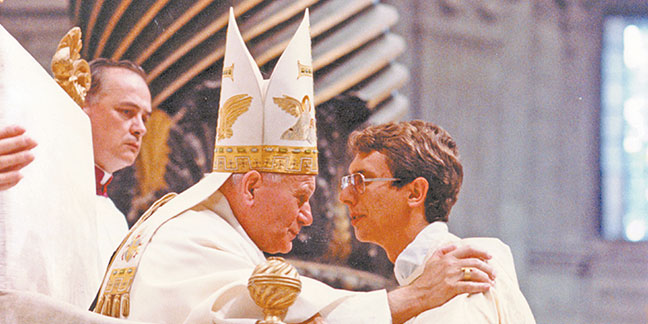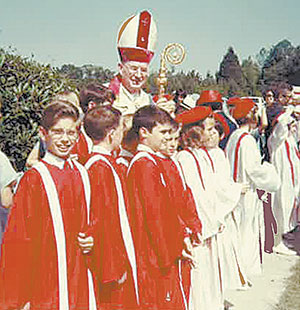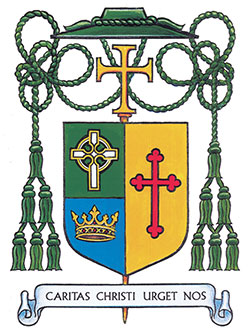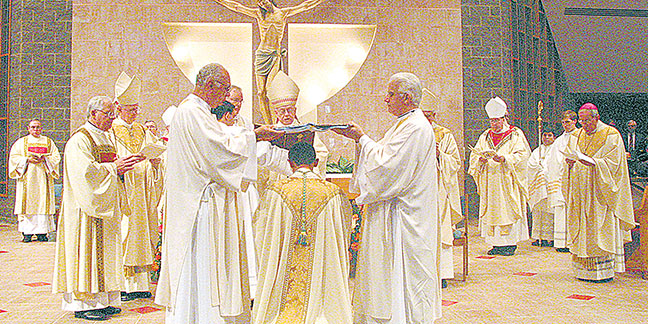 Photo provided Pope John Paul II gives the sign of peace to newly ordained Father Jugis during his ordination Mass at St. Peter’s Basilica on June 12, 1983.Bishop Peter Joseph Jugis is a native of Charlotte. The third-generation American – whose name in Latin means “constant” – hails from a diverse background, including Hungarian, German, Irish, Lithuanian and Czechoslovakian descents. His late parents, Joseph and Peggy Jugis, were born and raised in New York but relocated to Charlotte and married at St. Patrick Cathedral in 1953. When St. Ann Church was formed, the Jugises were among the original families.
Photo provided Pope John Paul II gives the sign of peace to newly ordained Father Jugis during his ordination Mass at St. Peter’s Basilica on June 12, 1983.Bishop Peter Joseph Jugis is a native of Charlotte. The third-generation American – whose name in Latin means “constant” – hails from a diverse background, including Hungarian, German, Irish, Lithuanian and Czechoslovakian descents. His late parents, Joseph and Peggy Jugis, were born and raised in New York but relocated to Charlotte and married at St. Patrick Cathedral in 1953. When St. Ann Church was formed, the Jugises were among the original families.
Monsignor Michael J. Begley, St. Ann’s pastor who would later become the first bishop of the newly formed Diocese of Charlotte in 1972, baptized the infant Peter Jugis and gave him first Holy Communion. As the family began to grow, they moved to a bigger house and joined St. Vincent de Paul, a mission of St. Ann before becoming its own parish.
He was educated in Catholic and public schools in Charlotte, earning a degree in business administration from the University of North Carolina at Charlotte in 1979. He supplemented his educational expenses by playing the organ during weddings at local parishes.
“I just began to realize my heart wasn’t in the accounting field,” he said in a 2003 interview. “I could do it intellectually, but I just didn’t feel that this was what I wanted to give my life to totally.”
While visiting St. Gabriel Church where he was to play at a wedding, he met Monsignor John McSweeney, then associate pastor and diocesan vocations director.
“After the wedding rehearsal, he asked me in passing if I had ever thought of being a priest,” Bishop Jugis said. “I told him, ‘No, I never had.’ He said, ‘Well, think about it, would you?’”
And so he did – a lot over the following year – “about what I could really give my heart to completely. I started to realize more and more that giving my life to God and serving the Church as a priest seemed to be agreeable at the time. Of course, I had to continue to discern and think, and talk with priests.”
His parents were supportive of his decision. “It was my mother who said, ‘Well, Peter, we were thinking that you had been moving in this direction for a long time, but we didn’t want to say anything to see if you would arrive at that conclusion on your own.’ It was a tremendous affirmation and confirmation of what I had been feeling and discerning privately for many months.”
 Bishop Peter Jugis (far left) is pictured on his confirmation day in 1969 with fellow confirmation students and then-Bishop Vincent Waters at St. Vincent de Paul Church in Charlotte, where his parents were founding members.After college he entered the seminary at the Pontifical North American College in Rome and then studied at the Pontifical Gregorian University in Rome.
Bishop Peter Jugis (far left) is pictured on his confirmation day in 1969 with fellow confirmation students and then-Bishop Vincent Waters at St. Vincent de Paul Church in Charlotte, where his parents were founding members.After college he entered the seminary at the Pontifical North American College in Rome and then studied at the Pontifical Gregorian University in Rome.
When he applied in 1979 to be a seminarian, he interviewed with Bishop Begley, who spoke about his concern for the “unchurched” in the state.
“I remember him saying to me, ‘There’s a lot of work we have to do in North Carolina.’ He was inviting me to study for the priesthood and to join him, I think, in the mission of the Catholic Church in North Carolina. I received from him a missionary spirit.”
He was ordained to the priesthood on June 12, 1983, by Pope John Paul II in St. Peter’s Basilica in Rome. His family was present at the ordination, as were Bishop Begley and Monsignor McSweeney.
He went on to serve at St. Ann Church in Charlotte, St. Leo the Great Church in Winston-Salem, Holy Infant Church in Reidsville, Queen of the Apostles Church in Belmont, St.
Patrick Cathedral in Charlotte, Holy Spirit Church in Denver, Sacred Heart Church in Salisbury, St. John Neumann Church in Charlotte, St. Mark Church in Huntersville, and Our Lady of Lourdes Church in Monroe.
In 1993, he became the first priest of the diocese to earn a doctorate in canon law, defending his thesis, “A Canonical Analysis of the Meaning of Humano Modo in Canon 1061, §1” at the Catholic University of America in Washington, D.C.
With his canon law training, he served as judicial vicar (leader) of the diocesan tribunal until becoming bishop.
On Aug. 1, 2003, Pope John Paul II appointed him the fourth Bishop of Charlotte, succeeding Bishop William G. Curlin, who retired in 2002. He was ordained at St. Matthew Church in Charlotte on Oct. 24, 2003, and is celebrating his 20th anniversary of ordination on Oct. 24, 2023.
— Catholic News Herald
Coat of arms

The design of Bishop Peter J. Jugis’ coat of arms has special significance to him. To the right is a gold field, representing the great treasure of the faith and the hope of salvation offered to us all by the gift of redemption. “With the gold background, I wanted to tie in the years that I studied in Rome and my priestly ordination by the pope,” said Bishop Jugis.
“The colors of Vatican City are gold and silver, so I chose the gold background for my coat of arms. Gold is also a reference to Our Lady, who in the Litany of the Blessed Virgin Mary is called ‘House of Gold.’ Gold is a precious metal, and Mary, as the mother of Christ, was the most precious ‘house,’ or dwelling place, of God.” The cross is in a style called “bottony,” with three circles at the end of the staff and the cross arms, denoting the Trinity.
“The design of the cross that I chose was inspired by a crucifix hanging in the living room of the rectory at Our Lady of Lourdes Church in Monroe,” said Bishop Jugis.
To the left are the escutcheons of the Diocese of Charlotte: a Celtic cross of silver-edged gold, which represents St. Patrick, patron saint of the cathedral church of the diocese, and a crown, representing Queen Charlotte, for whom the see city is named. Behind the coat of arms is a gold processional cross. The green heraldic hat with six “houppes,” or tassels, denotes the rank of a bishop.
Episcopal motto
“Caritas Christi Urget Nos” (“The Love of Christ Impels Us”) comes from St. Paul’s second letter to the Corinthians – 2 Cor 5:14-15 – and offers the inspiration for growth and formation in the faith, which Bishop Jugis said he wished to inspire in people as their pastor. “I wanted to have a motto that would somehow include Christ’s love in it. The love of Christ is planted in our hearts from the day of our baptisms. ... That love should be the reason and motivation for everything we do as Christians and for me as shepherd of the diocese.”
“After I had chosen it, I discovered the saint whose feast day is celebrated Oct. 24 – St. Anthony Mary Claret – the very day I’m being ordained, has the same motto. I thought it was an interesting coincidence.”
Ordination Day 2003: ‘A man for the times and for the place’
 Deacon Ben Wenning and Deacon Louis Pais hold the Book of the Gospels over Bishop Jugis’ head as Atlanta Archbishop John F. Donoghue prays the prayer of ordination during the ordination Mass on Oct. 24, 2003. CHARLOTTE — Speaking in both English and Spanish, Bishop Peter J. Jugis asked the faithful gathered for his ordination to help him carry on the Church’s mission of salvation.
Deacon Ben Wenning and Deacon Louis Pais hold the Book of the Gospels over Bishop Jugis’ head as Atlanta Archbishop John F. Donoghue prays the prayer of ordination during the ordination Mass on Oct. 24, 2003. CHARLOTTE — Speaking in both English and Spanish, Bishop Peter J. Jugis asked the faithful gathered for his ordination to help him carry on the Church’s mission of salvation.
“All of us, regardless of our particular vocation, are involved in this grand mission of salvation,” Bishop Jugis said.
An estimated 3,000 people crowded St. Matthew Church for Bishop Jugis’ spectacular two-hour ordination Oct. 24, 2003. Attendees overflowed into the parish gymnasium, where they watched the Mass via closed-circuit television.
Bishop Jugis, 46, a native of Charlotte, succeeds Bishop Emeritus William G. Curlin as shepherd of the 46-county Diocese of Charlotte, established in 1972.
The multicultural Mass, broadcast live on the Internet, featured West African drummers, children from St. Joseph Vietnamese Church dancing with candles in the aisles and music – including songs in Spanish, Korean and Vietnamese – that was representative of the diverse cultures of the diocese.
“We are a young Church. We are a rapidly growing Church, filled with joy and vitality and holiness and the love of Christ,” said Bishop Jugis. “We come from many different ethnic backgrounds and together we form the body of Christ – a living sacrifice of praise.”
Approximately 400 people participated in the opening procession, including priests, deacons, seminarians, abbots and representatives from diocesan parishes, missions, organizations, institutions and schools. Also included were clerical representatives of the Lutheran, Episcopal, United Methodist and Baptist denominations in North Carolina.
“God has given us great blessings on this day of joy, and it is a sign of His people’s love that we are gathered in such great numbers to witness the ordination of the Diocese of Charlotte’s fourth bishop, and to welcome him into the midst of his flock,” said Archbishop John F. Donoghue of Atlanta, the principal ordaining bishop and second bishop of Charlotte.
Archbishop Donoghue called on the people of the diocese to love and support Bishop Jugis, to seek his guidance and to accept his teaching in his role as their shepherd.
He called Bishop Jugis “a man for the times and for the place.
“Your heart, your soul, your roots are here in the hills and plains of North Carolina. You carry in the record of development of your vocation the blessing and encouragement of two of the finest servants of the Lord – Bishop (Michael J.) Begley and Monsignor (John) McSweeney.”
“And ... you were ordained by the hand of our most beloved and remarkable pope, John Paul II,” he continued. “But do not forget that it is Christ the Lord who has chosen you, and that when He chooses a bishop, He also chooses a martyr. And martyrs must be strong, for themselves and for the Church they live and die to foster.”
Flanking a kneeling Bishop Jugis, Monsignor McSweeney, now pastor of St. Matthew Church, and retired Monsignor Anthony Kovacic requested Archbishop Donoghue confer ordination on Bishop Jugis. Archbishop Gabriel Montalvo, apostolic nuncio, then read the apostolic letter of Pope John Paul II. Archbishop Donoghue questioned Bishop Jugis in the presence of the gathered people on his resolve to uphold the faith and to discharge his duties as bishop. Bishop Jugis then lay prostrate as the Litany of the Saints was chanted.
Next was the laying on of hands by the bishops on Bishop Jugis’ head. The ancient gesture, expressing the outpouring of the Holy Spirit, has been used since apostolic times for transmitting the authority and offices in the Catholic Church.
Deacon Ben Wenning, diocesan coordinator of the permanent diaconate, and Deacon Louis Pais of St. Gabriel Church in Charlotte then held the Book of the Gospels over
Bishop Jugis’ head, a gesture expressing the burden the bishop will assume of proclaiming the Gospel as a member of the college of bishops, as the ordaining bishops prayed the prayer of ordination.
His head was then anointed with sacred chrism, signifying the full share in the priesthood of Jesus he received through the laying on of hands and the prayer of ordination.
The Book of the Gospels was presented to Bishop Jugis as a symbol of a bishop’s ministry of teaching and preaching. He also received his ring, miter and crosier, which are signs of the office of bishop.
Bishop Jugis then took his seat in the cathedra, the bishop’s chair, and received a round of applause from the bishops and congregation.
In remarks at the end of Mass, Bishop Jugis resolved “to pray without ceasing to Almighty God for the holy people.”
“We all must know that the Lord’s work cannot be done without prayer,” he said.
Bishop Jugis expressed his gratitude for the priests and deacons of the diocese, and he addressed the importance of the laity: “The Second Vatican Council taught that sacred responsibility is given to the laity to grow in personal holiness day by day and to see to it that you make known the Gospel message of salvation to all people,” he said, “and that you transform our modern culture with the spirit of the Gospel.”
“All of this springs from prayer and from our celebration of the sacraments, especially from our communion with the Lord in the holy Eucharist,” said Bishop Jugis. “The Holy Spirit will guide us in helping make known the love of Christ.”
— Reprinted from the Oct. 31, 2003, edition of the Catholic News Herald



